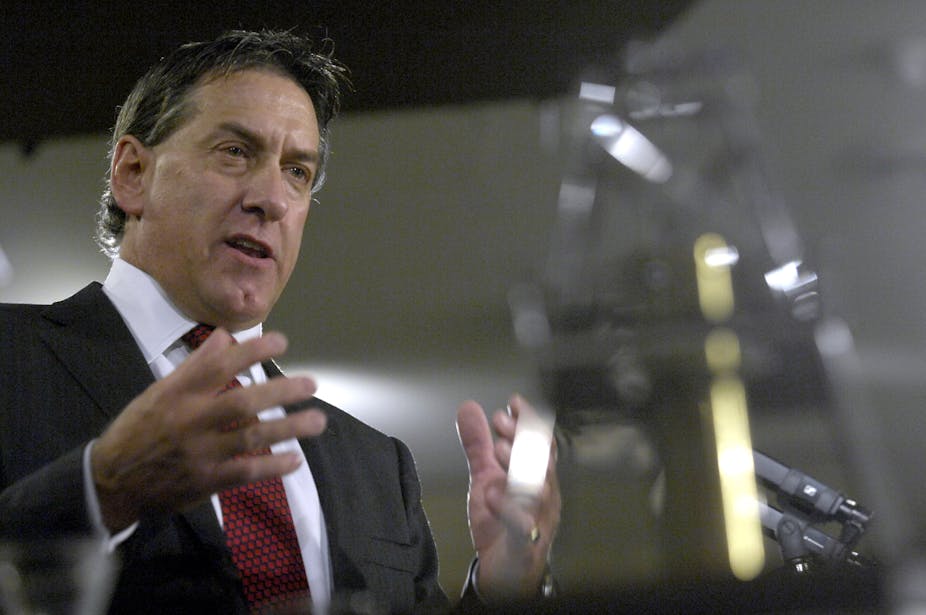Mitch Hooke, whose Minerals Council of Australia helped kill Kevin Rudd’s prime ministership, is bowing out of the front line – but slowly. With the debate about the much-emasculated Gillard version of the Rudd government’s mining tax still raging, Hooke announced he will step down as the council’s chief executive at the end of this year, though he will continue as an adviser for a further 12 months.
It’s about orderly transition. The council couldn’t look properly for a successor without it being known the incumbent planned to go. Hooke has been in the job since 2002; among his earlier gig were the Grains Council and the Food and Grocery Council (prompting one critical journalist to dub him “the king of the rent seekers”).
The Hooke announcement came as the Coalition and Greens combined to set up an inquiry into the mining tax, which has only raised $126 million in its first six months out of a $2 billion target for 2012-13. “More politics”, is Hooke’s answer when asked what will come out of the Senate probe. “It’ll be the Greens seeking to differentiate themselves.”
In an interview with The Conversation, Hooke warns the mining industry would become active in the run up to the September campaign if Labor “come after us”. In other words, if the government changed the tax.
Not that he anticipates this. PM Gillard has indicated change is not on the cards - apart from the government leaning on the states to prevent increases in their royalties, for which, under its deal with the miners, the federal government has to paid compensation to the companies.
Attempted changes to the tax – which the Greens have called for – would bring a reaction from the industry “as intense and as palpable as it has previously been”, Hooke says.
But “at the moment the government is holding the line on the deal. … I’m not here to defend this tax. It was never necessary in the first place. But we did a deal with the government of the day [after Gillard ousted Rudd] and I am here to defend the design elements that are under attack from the Greens and independents”.
Asked whether he has any regrets about the miners’ ferocious 2010 campaign, Hooke says, “Yeah – that it was necessary in the first place. Profoundly regret that”.
While not anticipating any pre-election tinkering, Hooke does not rule out that Labor, if re-elected, could try to toughen the tax – “I would suspect that it would be too tempting to not have a go”. He is confident an Abbott government would do as it says and scrap it.
He has a list of what a Liberal government would need to do generally: reform the labour market; address energy costs, infrastructure and transport; deal with problems in environmental and project approvals; improve education and training and “put a spike into this emerging protectionism”.
The latter shows itself in the government’s recent industry statement, including the requirement for “a bureaucrat sitting in our companies” with a plan for local purchasing. “It’s predicated on a false assumption and that is that we’re not buying locally. Our guys are buying 80-85% of their stuff here.
"It’s much better to buy locally anyway – we’re building communities – but if you can’t get your inputs at internationally competitive prices, then you are going back to the old days of featherbedding companies”.
Hooke also points to “the industrial relations environment” and “the whole idea that skilled migration is bad” (the government recently toughened conditions for 457 visas for bringing in foreign workers) as part of the resurgence of protectionism.
Looking at the history of the parties and the pressures, he does have fears that a coalition government might be protectionist. He observes the struggle: the free marketeers within the Liberals versus Nationals Senate leader Barnaby Joyce who is “quite vocal about foreign investment”.
“If you’re worried about people buying the farm, my view is you actually control the manner by which that investment is conducted in Australia.
"So if the farm is owned by a foreign company, you still have control over export licences, you still have control over project approvals … Don’t be worried about where the capital comes from; if you’re concerned about how and what capital is employed in Australia, use your domestic regulations to ensure you protect the interest, environment and welfare of all Australians”.
Hooke concedes that it “takes a lot of guts” to tell those in industries under pressure that “you’re going to be better off and the country’s going to be better off if we don’t run a protection racket, if you do go through the processes of structural adjustment.
"And that’s why I think the Hawke-Keating government was an outstanding government. They stood up to a lot of flak. I don’t think that we would have got those kind of reforms if it had been a Liberal coalition government back then, because I don’t think business would have let them”.

